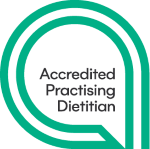
Your Accredited Practising Dietitian (APD) credential is a public guarantee of your dietetic expertise. As an APD, we'll promote you as a trusted professional who helps people be healthy and well.
Gain your credential by joining our APD Program. It's the national credentialing program for dietitians in Australia.
On this page:
Benefits of being an APD
As an Accredited Practising Dietitian, you'll get recognition for your professional qualifications. You'll also get help with your ongoing training and practice standards.
Our APD Program helps dietitians deliver high-quality dietetic services in Australia.
APDs are the only dietetic professionals recognised by Australian Government organisations. APDs with a provider number can offer rebates under Medicare and the Department of Veterans' Affairs (DVA).
APDs are the only dietetics professionals recognised by state governments and many private health insurers.
Your APD credential is a public guarantee of your nutrition and dietetic expertise. It tells people you have the best qualifications to give expert nutritional advice. An APD's service is safe, ethical and evidence-based.
A commitment to maintaining your knowledge and skills keeps you on top of your game. You'll study industry trends and log continuing professional development (CPD). All this makes you better equipped to help people with their diet and nutrition.
As Australia's leading voice on nutrition, we advocate for the role of APDs. We raise awareness about the importance of nutrition in public health. As an APD, we'll promote your services and help people find you via our Find a dietitian search
APDs, dietitians and nutritionists
In Australia, all dietitians are nutritionists. But not all nutritionists can call themselves a dietitian.
As a profession, nutritionists aren't regulated and can have limited qualifications.
Dietitians are university educated and qualified to deliver evidence-based services, including:
- food service management
- group dietary therapy
- individual dietary counselling
- medical nutrition therapy
Dietitians have the knowledge and skills found in the National Competency Standards for Dietitians.
Learn more about the difference between dietitians and nutritionists.
How to become an APD
For the credential, you must join the APD Program. It's Australia's national credentialing program for dietitians.
You can join the APD Program if you either:
- Hold an accredited Australian dietetics degree.
- Hold a mutually recognised dietetics degree from New Zealand.
- Have passed our Dietetic Skills Recognition (DSR) process.
To learn more about eligibility, read our APD Policy.
There are 2 ways to join the APD Program.
You can apply for direct entry into the APD Program if you either:
- Graduated from an Australian accredited dietetics degree within past 3 years.
- Completed our DSR within the past 3 years.
- Have been an active Full APD at some point in the past 3 years.
If you can't apply for direct entry, you might qualify for an Resumption of Accredited Practising Dietitian (RoAPD) to the APD Program.
Our RoAPD pathways are:
- Restart
- Reboot
- Retest
If you've taken a break from the APD Program in the past 3 years, you can reinstate your status if you've completed at least 450 dietetic practice hours over the past 3 years. You'll need to sign the APD declaration and restart your continuing professional development.
If you've been away from the APD Program for more than 3 years, you can apply to rejoin the program via an alternate pathway.
Learn more about how to rejoin the APD Program via Resumption of Accredited Practising Dietitian.
Program requirements
All APDs must commit to:
- undertake continuing professional development (CPD)
- follow our professional standards
- maintain recency of practice hours
- be subject to our audit and complaints process
Detailed program requirements are in the APD Handbook on our Member Portal
Working with a mentor is a great way to build your knowledge and professional networks.
All APDs must log 30 hours of CPD each year. Developing a CPD plan and learning goals will help you get the most out of your ongoing learning.
All APDs must agree to work to their scope and follow our professional standards. Our standards help you deliver safe, effective and evidence-based dietetic services.
APDs must declare and maintain wither 150 hours in the previous 12 months or 450 hours in the previous 3 years. (Some exemptions apply to new APDs and those who’ve joined through DSR or Resumption of APD) When you maintain your recency hours, we know your skills and knowledge are up-to-date.
We randomly audit our APDs to make sure they're following program requirements. All APDs are subject to our complaints and disciplinary process.
Types of APDs
As a Full APD you must meet our program requirements to maintain your APD status.
The Advanced APDs (AdvAPD) credential is for dietitians who are emerging leaders in their field. We recommend you work as a dietitian for at least 5 years before you apply for AdvAPD. AdvAPDs must meet our advanced competency criteria.
Governance
Our APD Program aligns with standards set by the National Alliance of Self Regulating Health Professionals.
The Dietitian and Nutritionist Regulatory Council is responsible for the regulating the APD credential.
Learn more about the Dietitian and Nutritionist Regulatory Council.
Register of APDs
We keep an up-to-date register of all APDs. Members can check the APD status of a dietitian using our Register of Accredited Practising Dietitians.
To find an APD in your area for a dietetic consultation, use our Find a dietitian search.
Get in touch
If you have questions about becoming an APD, contact us at apd@dietitiansaustralia.org.au or call 02 6189 1200.